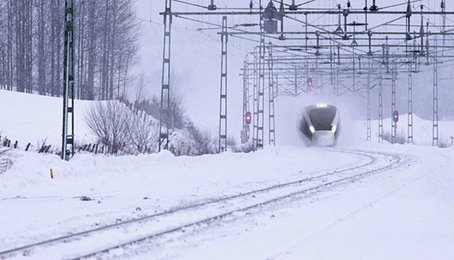High-Speed Train Research Pulls into the Station
NEWS
The Gröna Tåget (Green Train) study is approaching its final destination. The potential benefits of future high-speed trains presented by researchers include increased revenue for train operators, fewer delays and up to 30 percent more trips on existing tracks.

Gröna Tåget is a concept for Scandinavian high-speed rail travel, as well as the name of a major seven-year research study involving scientists from KTH’s Railway Group research centre, the Swedish Rail Administration, the manufacturing conglomerate Bombardier, and several rail operators.
The Gröna Tåget study recently delivered two extensive research papers describing a variety of ideas, proposals and technical innovations that would make possible a 250 kilometre-per-hour train running on existing Scandinavian rails — in a harsh winter climate, with increased profit margins for train operators, and with improved service for business and leisure travellers.
“Operators’ costs can be reduced by 15 to 25 percent compared to other scenarios,” says Oskar Fröidh, one of the KTH researchers working with Gröna Tåget. “One factor here is that the Green Train has wide passenger coaches that can fit more seats in each car. It’s suitable in Sweden, Norway and Finland, and testing is underway in Denmark.”
Fröidh goes on to say that scientists have focussed on designing Gröna Tåget to be highly flexible, and to be able to run throughout Scandinavia on both fast regional service lines and long-distance routes.
Gröna Tåget can lead to increased passenger traffic, as shown by examples from Sweden, where projections call for up to 30 percent more demand compared with today’s high-speed rail traffic. The researchers predict that shorter travel times, lower fares and fewer transfers will add up to a more attractive offering.
“Train passengers can get cheaper tickets and faster journeys with Gröna Tåget,” Fröidh says. But getting the full benefit from new high-speed lines will require upgrading the rails for higher speeds.”
Another benefit of Gröna Tåget will be improved punctuality even in peak travel times. Efficiently designed train doors and compartments, along with streamlined baggage handling, should make it possible to reduce station stop times and delays.
“An important goal is to shorten travel times while offering a quiet journey with little vibration,” says Evert Andersson, professor emeritus at KTH and Gröna Täget co-ordinator. “That means you should be able to run at 250 kilometres an hour on existing upgraded lines, and take curves faster than today’s trains. We’ve developed an active suspension system that gives a very pleasant journey at higher speeds even if the tracks aren’t perfect. We’ve also worked toward ‘track-friendly’ trains that don’t require extensive additional maintenance.”
Andersson adds that the research team set a Nordic rail speed record of 303 kmh on existing track, just meeting the requirements for normal operation at 200 kmh. Stress on the track was much lower than limits for today’s trains at lower speeds.
These advanced trains of the future will reduce environmental impacts below the already good performance of today’s trains.
“Energy consumption will be reduced by 25 to 35 percent for each passenger-kilometre thanks to reduced air resistance, more efficient engines and the proposed coaches with more seats per meter,” Andersson says.
He adds that external noise shouldn’t increase despite the higher speeds. “The most important thing for the environment is that the train is so attractive and affordable for travellers that they’ll choose rail instead of other means of transport.”
Sebastian Stichel, director of the KTH Railway Group adds, “Gröna Tåget research has given us a lot of useful results, and we’ve been very effective in terms of the total budget.”
By Peter Larsson

